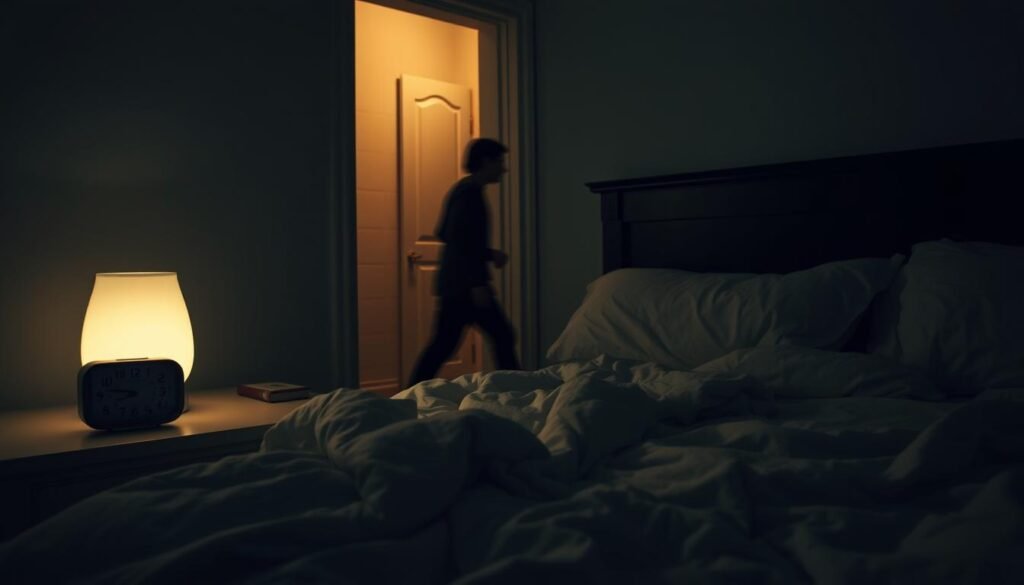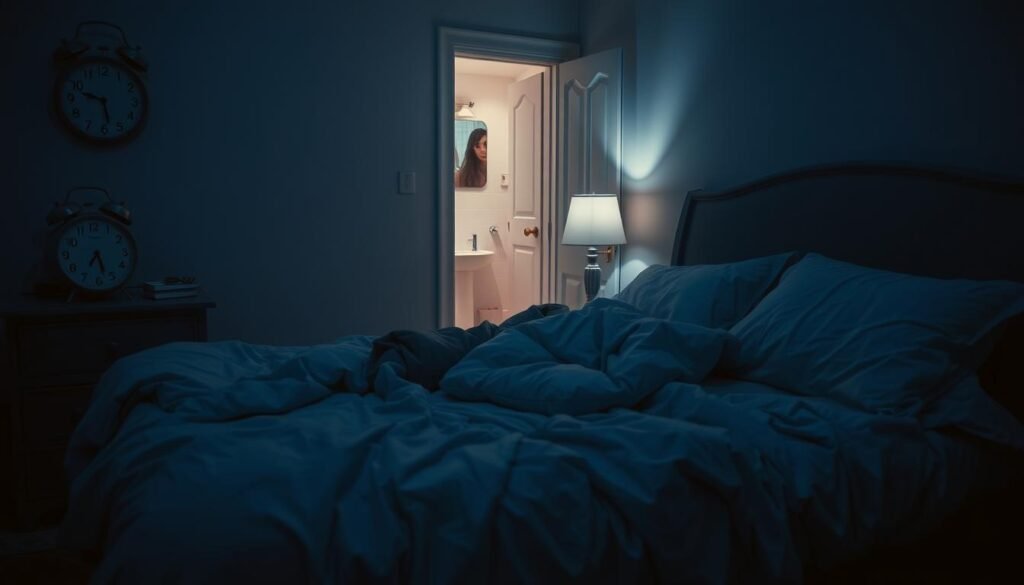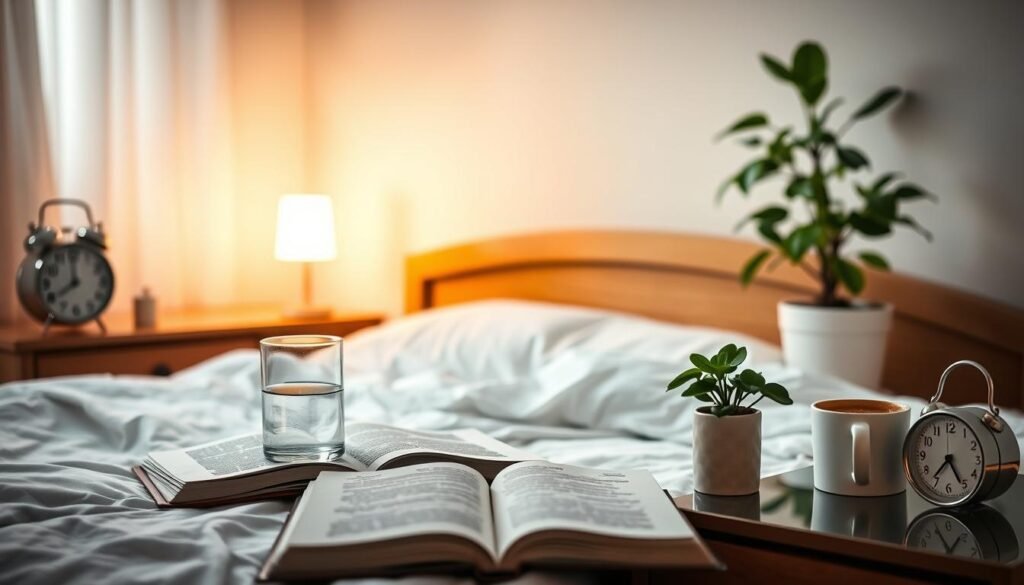About 40% of adults aged 18 to 79 wake up to pee one or more times at night. This common issue shows how many people suffer from disturbed sleep. Nocturia affects older adults more, hitting nearly half of men in their seventies. Up to 80% of older adults face this problem. It’s key to understand the link between frequent urination and sleep trouble.
Nighttime urination might suggest health problems, thus it’s vital to explore its causes. From an overactive bladder to urinary tract infections, these conditions should not be ignored. Knowing how bladder issues affect sleep can help in finding better solutions for nocturia.
Key Takeaways
- 40% of adults between 18 to 79 report nocturia.
- Nocturia affects almost 50% of older men, significantly impacting sleep quality.
- Underlying conditions like urinary tract infections and overactive bladder contribute to increased nighttime urination.
- Understanding these conditions is vital for managing frequent urination effectively.
- Improving knowledge about frequent urination can enhance the quality of life for those affected.
Understanding Frequent Urination
Frequent urination affects daily life, making it tough for those who feel the need to go often. This issue means you have to urinate more than normal, especially at night. This interrupts sleep. It’s important to know this can come from several health problems. Knowing the different conditions linked to frequent urination is key.
Defining Frequent Urination
Frequent urination means going more than eight times a day, or waking up often at night to go. This is called nocturia. Lifestyle, certain meds, and health issues may worsen it. Drinking lots of fluids before bed increases urination. Also, many over 50 may struggle with bladder problems, like nocturia, affecting sleep.
Common Conditions Associated with Frequent Urination
Several health issues can cause frequent urination, including:
- Urinary tract infections (UTIs)
- Diabetes
- Overactive bladder
- Enlarged prostate (BPH)
- Pregnancy
- Chronic kidney disease
- Obstructive sleep apnea
Some meds, like diuretics, make you urinate more. An overactive bladder means going a lot during the day and night. Knowing these conditions linked to frequent urination helps in dealing with them.
Nocturia: A Deeper Look into Nighttime Urination
Nocturia means needing to wake up at night to pee. It affects lots of people worldwide. This issue can disturb sleep, especially in older adults who may wake up many times. Understanding nocturia helps us manage its impact on health and sleep quality.
What is Nocturia?
Nocturia causes waking at night to urinate, often more than once. About 50 million people in the U.S. experience it. It’s more common as people get older. For example, after 60, men often face it due to prostate issues. Many over 30 wake up twice or more, affecting their sleep.
How Nocturia Affects Sleep Quality
Nocturia greatly impacts sleep. Many find it hard to sleep again after waking up. This can lead to not enough sleep and feeling tired during the day. Over 40% of affected people struggle to fall back asleep at night.
This issue can cause other health problems like depression, gaining weight, and heart issues. It can also hurt work performance and relationships. So, it’s important to deal with nocturia. It links to higher healthcare use and other health risks. For more on this topic, you can check out this source.
| Aspect | Details |
|---|---|
| Prevalence | Up to 50 million individuals in the U.S. experience nocturia |
| Common Age Group | Higher occurrence in individuals aged 60 and older |
| Impact on Sleep | Over 40% struggle to go back to sleep after voiding |
| Health Risks | Linked to increased cardiovascular disease, obesity, and diabetes |
| Gender Differences | More prevalent in women under 50, shifts to men post-60 |
Common Causes of Sleep Interruptions
Getting to know what disrupts sleep can really make a difference. Things like how much you drink and certain health issues matter.
Impact of Fluid Intake on Sleep Patterns
Drinking a lot, especially before bed, often leads to disrupted sleep. This is because you might have to wake up in the night to use the bathroom. Drinks with caffeine or alcohol are even worse. They can irritate your bladder and make you urinate more. If you drink less before bed, you might sleep better.
Medical Conditions Contributing to Sleep Disturbances
Many health issues can mess with your sleep. For example, diabetes can make your blood sugar high. This leads to night sweats, thirst, and needing to urinate often. Sleep apnea is another big problem. It causes you to wake up many times at night. Then there’s overactive bladder syndrome (OAB), which makes you feel like you always have to go. Diseases like kidney disease and heart failure can also make sleep hard. That’s because your body struggles to handle fluids the right way.
Frequent Urination and Sleep Interruptions: The Connection
The connection between urination and sleep matters a lot. At night, going to the bathroom often can mess up your sleep. Around 50 million people in the U.S. have nocturia, which breaks their sleep cycle. They wake up many times at night because they need to pee. This stops them from getting the deep sleep they need.
Who gets up at night to go varies by age, gender, and race. For example, women between 18-49 see this issue more than men. But after 60, it’s more common in men. Hispanic and African-American adults also report it more often. These differences show that sleep is influenced by many factors.
Knowing why you’re waking up can help fix your sleep. Nocturnal polyuria is the main reason for 88% of people who wake up to pee. To deal with this, changes in lifestyle and treatment can help sleep better. Things like medication and changing behaviors can make a big difference. By being aware and taking action, many people can improve their sleep quality.

| Demographic Group | Prevalence of Nocturia |
|---|---|
| Overall U.S. Population | 50 million |
| Adults over 30 | 1 in 3 |
| Individuals over 65 | 24% |
| Women aged 18-49 | Higher prevalence than men |
| Men aged 60+ | Higher prevalence than women |
| Hispanic and African-American Adults | More prevalent |
Role of Overactive Bladder
An overactive bladder (OAB) can greatly affect daily life, especially sleep quality. Those with this condition often face several symptoms that need attention. Learning about these symptoms and finding the right treatments can improve life.
Symptoms of Overactive Bladder
Overactive bladder symptoms include a strong need to pee often, both day and night. Nighttime symptoms, like waking up often to pee, are common. Around 31% of women with OAB get up at least twice a night. This can really affect sleep, making them tired and unhappy.
Management Options for Overactive Bladder
Managing an overactive bladder usually involves lifestyle changes, exercises, and medicines. Doing Kegel exercises helps a lot. They suggest doing three sets of 8-12 contractions for 6 to 10 seconds, several times a week.
Doctors may also recommend behavior changes, medicines, and sometimes surgery to help. Taking action can greatly reduce nighttime symptoms and improve sleep. For more information, check out this research study.
Urinary Incontinence and Its Effects on Sleep
Many individuals, especially older adults, suffer from urinary incontinence. This means they lose urine without meaning to. This problem can mess up their sleep, making life more difficult. Different kinds of urinary incontinence, like stress and urge incontinence, often wake people up at night.
Understanding Urinary Incontinence
About 22.3% of older adults deal with urinary incontinence. Bedwetting is part of this issue but people don’t talk about it much due to embarrassment. It’s important to see it as a clue to other bladder problems. Conditions like hormonal changes or an enlarged prostate might be the cause. Things like watching how much you drink and using alarms can help manage it.
Link Between Urinary Incontinence and Disrupted Sleep
Urinary incontinence really affects sleep. A study with 184 older adults showed those with incontinence were much more likely to complain about their sleep. The need to pee at night can make people anxious and disrupt sleep even more. By dealing with incontinence, people can sleep better and feel less stressed. Focusing on this can improve sleep for many older adults. For more information, check out this study on urinary incontinence and sleep.

| Condition | Prevalence | Impact on Sleep |
|---|---|---|
| Urinary Incontinence | 22.3% of older adults | Increased likelihood of sleep complaints |
| Bedwetting | 1-2% of adults | Disrupted sleep patterns |
| Overall Sleep Complaints | 27.2% of studied participants | Often linked to urinary issues |
Polyuria: Excessive Urination Explained
Polyuria means you pee a lot more than normal—up to 15 liters a day. Usually, people only make about three liters daily. This condition can happen during the day or night. It can really affect your life.
Causes of Polyuria
Many things can cause polyuria. Here are the most common:
- Diabetes: Polyuria can be the first sign of diabetes due to high blood sugar.
- Excessive fluid intake: Drinking too much can lead to more peeing.
- Kidney conditions: Kidney problems increase polyuria risk.
- Medications: Some drugs, like diuretics and SSRIs, make you pee more.
- Hormonal imbalances: These can lead to excessive thirst and peeing.
When to Seek Medical Attention for Polyuria
If polyuria is messing with your sleep or daily life, see a doctor. Getting help early is key. Doctors use tests like urine analysis, blood work, and function tests. They help find the cause and decide on treatment.
Life Changes to Reduce Nighttime Urination
Changing your lifestyle can help with nighttime urination. By managing your fluids and making some lifestyle changes, you can sleep better. You’ll go to the bathroom less at night.
Tips for Managing Fluid Intake
It’s key to control how much you drink to lessen nighttime peeing. Here’s how:
- Drink less before bed.
- Stay away from things like coffee and alcohol that can make it worse.
- Don’t drink too much before sleeping.
Lifestyle Adjustments for Better Sleep
Making certain changes in your life can also improve your sleep. These changes help:
- Have a bedtime routine to calm down.
- Do pelvic floor exercises, like Kegels, for better bladder control.
- Try treatments that help you control your bladder and reduce night urges.
These habits not only help with nighttime peeing but also make your sleep better. For those dealing with pee issues due to stress, check out this link. It gives great info.

Seeking Medical Help for Frequent Urination Issues
Knowing when to seek medical help for frequent urination is key. It can really improve your life. In the U.S., about 50 million people have issues with urinating at night. If you’re one of them, seeing a doctor is important, especially if other symptoms appear.
When to Consult a Healthcare Provider
If you go to the bathroom too often, consider seeing a doctor if:
- It messes with your sleep.
- You suddenly need to go or have accidents.
- You feel pain or see blood when you pee.
- Your bathroom habits change, especially as you get older.
- You show signs of something more, like diabetes or prostate problems.
Possible Diagnostic Tests and Procedures
A doctor might suggest tests to find out why you’re going so often. These tests check for health issues causing your symptoms. Common tests include:
| Diagnostic Test | Description |
|---|---|
| Urinalysis | Looks for signs of infection, blood, or sugar in your pee. |
| Blood Tests | Checks how well your kidneys work and hormone levels. |
| Bladder Scan | Measures how much pee is in your bladder to see if there are retention problems. |
| Cystoscopy | Lets doctors see inside your bladder for any weird things. |
| Urodynamic Testing | Checks bladder pressure and flow to understand how well it’s working. |
Conclusion
Having to pee often can really change your day. If you are up at night a lot to go, you might have nocturia. This happens a lot as people get older. In fact, up to 79.3% of older adults might experience it. Choices like drinking a lot of water before bed or having caffeine can make it worse.
To sleep better, it’s good to make some changes. Try drinking less at night and move around more during the day. If these tips don’t help, it’s wise to talk to a doctor. They might suggest medicines or other treatments that could work better for you.
If you often need to pee at night, it could affect your sleep. But, by facing this problem, you can help yourself feel better. Talking with a doctor can help you find good solutions. This way, you can improve not just your nighttime trips but your overall sleep too.